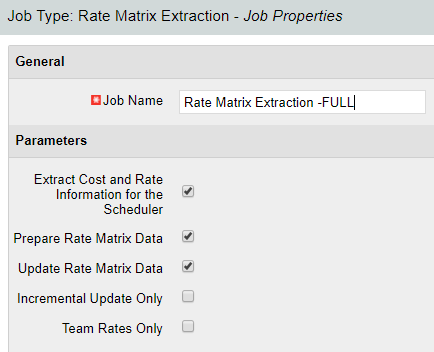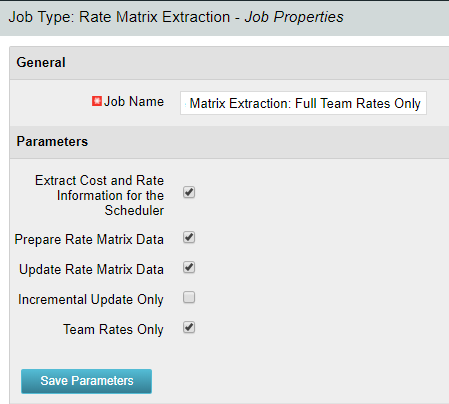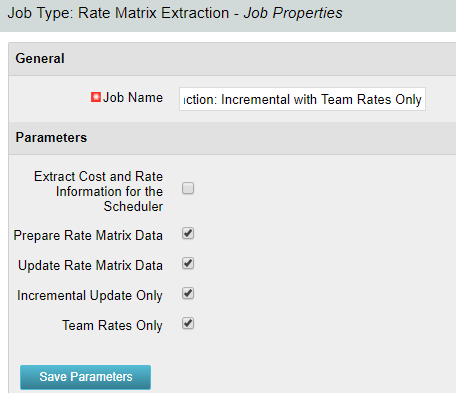Rate Matrix Extraction job overview / getting started
Article ID: 25696
Updated On:
Products
Issue/Introduction
This article covers the following regarding the Rate Matrix Extraction job:
- What does the Rate Matrix Extraction job do and how is it used?
- How do you schedule the Rate Matrix job and which options do you pick?
- How to set up Incremental/Team Rates RME job for better performance
Environment
Release: Any
Resolution
What does the Rate Matrix Extraction Job do?
The Rate Matrix Extraction (RME) job takes the resources who are assigned to projects and tasks on those projects and finds out what the applicable rates and costs are for the duration of their assignment. Since that information is coming from financial rate matrices, you need to run this job if the matrix has changed. The data populated by this job is primarily used by:
- Baselines
- The Post Timesheets job
- The Update Earned Value Costs Totals job (or 'Update Costs Totals' actions within a project).
You also need to run this job if you have created or updated:
- Project dates
- Team members
- Task assignments
RME Job Parameters Description
RME job parameters description including different combinations for different use cases:
- Extract Cost and Rate Information for the Scheduler - Specifies extracting cost and rate information for a desktop scheduler. This field is a flag that triggers the job to generate resource rates for an investment that include rates prior to the start and after the finish date of the investment. If not using scheduler it can be left unchecked>
- Prepare Matrix Data - Specifies adding the updated rate matrix data to a temporary table NBI_PROJ_RES_RATES_AND_COSTSCP. The data in the NBI_PROJ_RES_RATES_AND_COSTS table stays intact. The rate matrix data is available.
- Update Rate Matrix Data - Specifies copying the updated rate matrix data from the temporary table NBI_PROJ_RES_RATES_AND_COSTSCP to the NBI_PROJ_RES_RATES_AND_COSTS table. The rate matrix data is not available.
- Incremental Update Only - Specifies rates extraction only for currently updated projects. Running the job takes less time when compared with a full run.
- Team Rates Only - If this option is NOT selected, then the job populates all the rates pertaining to the team and task assignments. If this option is selected, the job populates the rates related ONLY to the team. It does not extract task assignment rates.
Examples of how to select the parameters:
Full RME

Full RME with TEAM RATES ONLY

Incremental (with and without Scheduler Cost and Rates):
Incremental with Team Rates Only

When to run the Rate Matrix Extraction job
- As a rule of thumb, we recommend that you run this job at least once a week prior to posting timesheets, but no more than once a day.
- For a system size with a large dataset, you should expect the job to take a fair amount of time and consume database resources.
- We recommend scheduling it every few days to run at night when there is not a whole lot of use activity going on.
- Running the job during business hours can make the system slow for all connected users.
Example: Split up the job with different combinations of options to prepare the data and update the data just in time for posting timesheets or working with project baselines.
-
- Create a scheduled job with the option to incrementally prepare the matrix data for non-peak time.
- Create a scheduled job with the options to incrementally update the matrix data for a time just prior to executing the ‘Post Timesheets’ job.
- When splitting this up, be sure to advise your users to create or update project baselines only AFTER the incremental update (#2) has completed to ensure the costs are computed as expected. Once a baseline is created, the snapshot costs cannot be changed.
Tips
- Due to other job dependencies, it is recommended that the 'Rate Matrix Extraction' job is executed successfully prior to the execution of the below jobs:
- Datamart Extraction job
- Post Timesheets job
- Update Earned Value Costs Totals job
- Extract Cost and Rate Information for the Scheduler check box in the Job page may impact the performance of the job
- If the flag is checked then the rates for the resources who are assigned to a project are calculated beyond the project start and end date
- These calculations add time to the processing for the Rate Matrix job
- The additional data beyond the project start and end date is used by the scheduler (OWB & MSP where the user can shift the project start and end dates).
How are rates derived?
- After the Rate Matrix Extraction job runs, the NBI_PROJ_RES_RATES_AND_COSTS populates with various rows based on resource/project/task details.
- For all the Earned Value metrics (baseline values, ACWP, etc cost) the row that is used is the -1 row. This row comes from the team settings.
- If the rates are not updated before posting timesheets or creating baselines, the costs may not be what is desired.
- If the data in the extraction table does not exist for a date range used in a baseline or timesheet posting, the application will use a $1 rate.
- If you have modified rates and modified projects and the extraction table is not updated, an incorrect rate could be used for the baseline or timesheet posting.
Additional Information
To ensure there is no conflict between the Rate Matrix Extraction job and other jobs in the application, it is recommended to update the job definition for 'Incompatible Jobs' is updated
